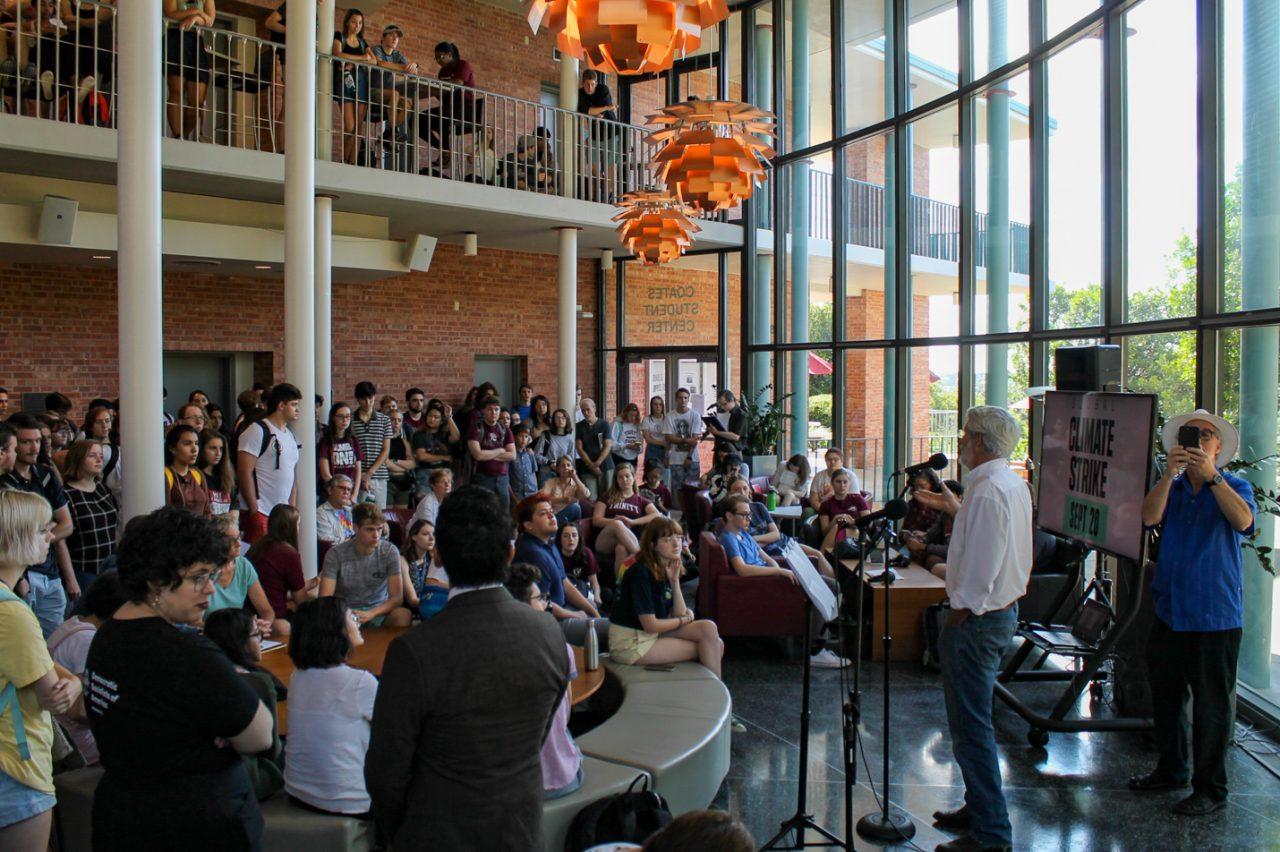Photo by Oliver Chapin-Eiserloh
Trinity faculty, students, staff and San Antonio community members rallied together against climate change by attending a teach-in last Friday in the Coates Student Center (CSC). The teach-in was attended by more than 100 people throughout the event.
According to Richard Reed, professor of anthropology and sociology, the teach-in aimed to get people to defend the environment because they understand the implications of climate change, rather than guilt them into taking action.
“It’s to inspire in people the desire to take action to stop climate change. It’s their desire that will take them to the event,” Reed said in an interview. “We believe that climate change is serious enough that if people understand the change that will happen, they will be moved to become educated and take action to change.”
The teach-in consisted of speeches, songs and poems given by professors, students and off-campus speakers. The talks ranged from impassioned speeches about climate change and its effects to communal singing and poetry readings.
The teach-in comes as a response to a worldwide call to action against climate change. In San Antonio, climate-action strikes were held on Friday, Sept. 20 and Saturday, Sept. 21. For Reed, the teach-in was a forum to spread awareness of the issues surrounding climate change.
“I think it’s important to everybody. I think I’m especially attentive as I’ve spent the last years teaching about the topic and currently, I’m teaching several courses that deal with climate change,” Reed said. “Once you become aware of the issues, you can’t help but consider them important.”
The teach-in was organized by a group of Trinity professors including Reed, David Spener, professor of sociology and anthropology, Alfred Montoya, professor of sociology and anthropology, Judith Norman, professor of philosophy and Greg Hazleton, professor of English and professor in the environmental studies program. To Hazleton, the teach-in was important to the Trinity community as a means of demonstrating solidarity with the strikes happening across the world.
“The first [reason] is that [the teach-in] is in conjunction with and support of strikes happening all around the world that have been inspired by a teenager from Sweden named Greta Thunberg,” Hazleton said. “We wanted to show our support and mostly young people are organizing the strikes. As adults, wanted to show our support to show that we are listening and on their side for taking action.”
Apart from this, Hazleton feels that teach-ins are a good way of getting students together, talking and teaching each other about climate change. Additionally, they serve as a way of bringing the community together in the face of an urgent issue.
“We think that this teach-in is a way for everybody—students, staff, faculty, administration—to remember that though the news on climate is not encouraging, falling into isolation and despair is not an option,” Hazleton said. “This is a way to gather as a community and to remind ourselves that whatever news we hear that we think is pretty dire in terms of what the future holds in terms of climate change, we’re here to support each other.”
The teach-in drew first-year, Abrianna Citta because of her long-held passion for the environment and desire to take action against climate change.
“I heard about it through the Climate Changed First-Year Experience. It was my first choice for the FYE so I’m really interested in it,” Citta said. “I heard about the global climate strikes but I didn’t know there was going to be one at Trinity. It’s something I’m really passionate about and want to pursue more actively. It’s really cool to see so many Trinity students here passionate about the same issue as me.”
Senior Declan Kiely presented an original poem on climate change. Kiely drew on his frustration with the discourse on climate change.
“I wrote the poem I read an hour before the teach-in,” Kiely wrote in an e-mail interview. “The general message of the poem was that I am frustrated with the state of the conversation about climate change, and I don’t think enough is being done. The issues we are facing can be better combated if we talk about ethical production rather than patting ourselves on the back for making ethical choices when consuming. The change we need is a systematic one.”
Correction: The original version of this article stated that roughly 40 people attended the teach-in. More than 100 people attended the teach-in over the course of the two hours it was held.













